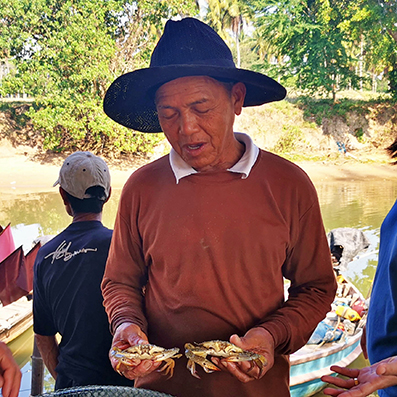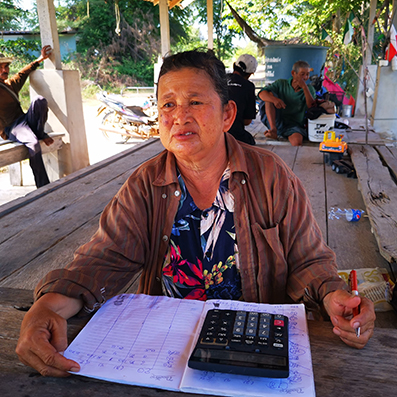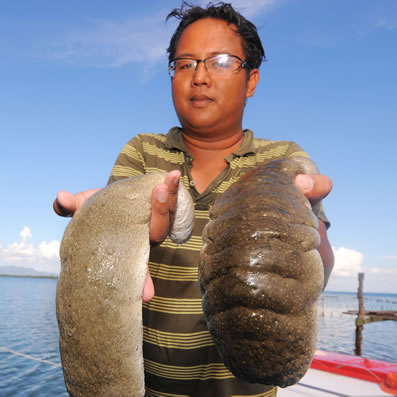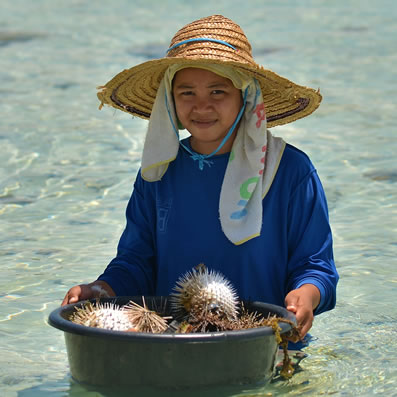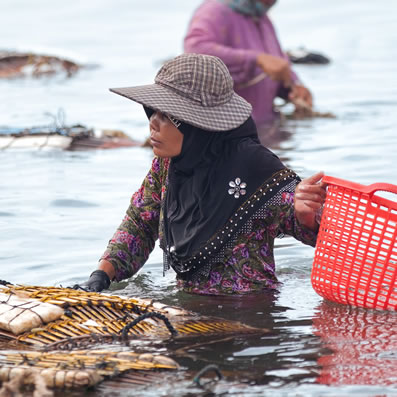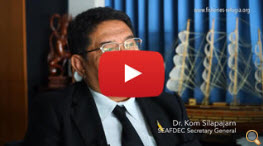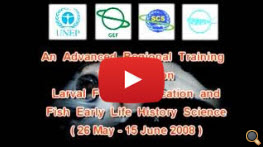THE SOUTH CHINA SEA FISHERIES REFUGIA INITIATIVE
FISHERIES REFUGIA PROJECT SITES
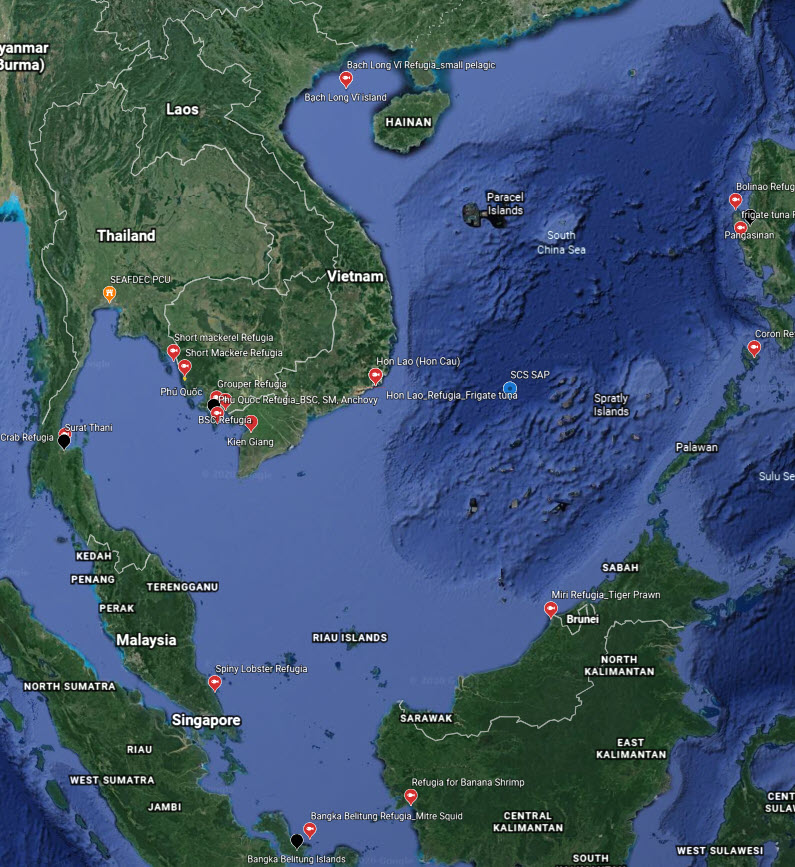 Click Here for
Click Here for More
Information
SCS SAP PRIORITY SITES (Habitat Linkages)
 All SCS SAP and
All SCS SAP and Fisheries Refugia
Priority Sites CHINA HABITAT
SITES CAMBODIA HABITAT
SITES INDONESIA HABITAT
SITES PHILIPPINES HABITAT
SITES THAILAND HABITAT
SITES VIET NAM HABITAT
SITES
Meet our Stakeholders
Social Media
Social Media
INTEGRATED COASTAL ZONE MANAGEMENT (ICZM) IN THE CONTEXT OF FISHERIES REFUGIA APPROACH
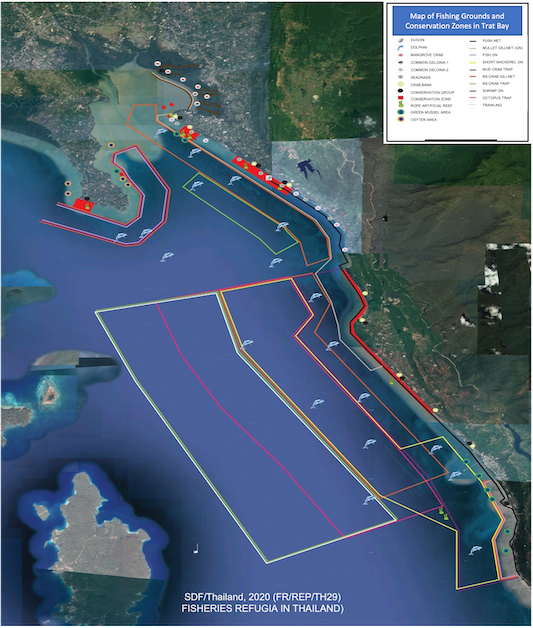
Figure: Credit to SDF/Thailand
FR APPROACH
Fisheries Refugia (FR) is a novel fisheries resources management approach to the identification and designation of priority areas in which to integrate fisheries and habitat management in the context of maintaining fish stock and critical habitats as satisfying the fishing community, social needs now and futures. The approach needs a good platform for building partnerships, enhancing communication and engagement of stakeholders, finding local and scientific-based knowledge, and put in place an effective integration of fisheries and habitat management. In some cases, the management of FR may include the transboundary fish stock or shared stocks issues in which cooperation among relevant states is needed to take into accounts.
The establishment and operations of a regional system of fisheries refugia deal with the complex actions defined into five objectives: 1) good governance, 2) social engagement, 3) economic well-being, 4) healthy ecosystem, and 5) emerging issues, particularly the climate change and gender mainstreaming issues (Figure 1). In the South China Sea and the Gulf of Thailand Sub-regions, against the general background of uncertainty and complexity associated with the development of fisheries refugia, there is a need to develop robust and workable solutions to involve stakeholders in establishing and managing refugia. An emerging appreciation of the diverse traditions and cultures in the region and the important role of small-scale, coastal, and subsistence fisheries has recently provided an impetus for the development of fisheries refugia approaches to stakeholder participation in the management of fisheries at all levels.

Fisheries Refugia is based on the “ecosystem approach” concept like many existing approaches such as Marine Spatial Planning (MSP), Coastal Resource Management (CRM), Co-management, and Integrated Coastal Zone Management (ICZM). FR is developed in parallel by different user groups with specific management interests. FR shares many of the same principles and has many commonalities with other approaches, but management focus or coverage can be different and support each other. In practice, FR can incorporate conventional fisheries management and overlaps with co-management, MSP, and ICZM, as shown in Figure 2.
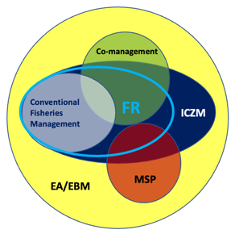
HOW DOES FR LINK TO OTHER ECOSYSTEM APPROACHES?
How does FR link to Marine Spatial Planning (MSP)? MSP is a public process of analyzing and allocating the spatial and temporal distribution of human activities in coastal and marine areas to achieve ecological, economic, and social objectives usually specified through a political process ( UNESCO , 2009). The term covers both (i) a plan for users; and (ii) implementation tools – e.g., zonation that includes Marine Protected Areas (MPAs). MSP can be thought of as a management action for achieving Ecosystem Approach (EA) objectives in fisheries and considering multiple sectors.
It is considering the Integrated Coastal Zone Management (ICZM), a resource management system that follows an integrative, holistic approach and an interactive planning process in addressing the complex management issues in the coastal area. ICZM uses the ecosystem approach to manage land, water, and living resources in coastal areas and promote conservation and sustainable use equitable. Compared to the FR, in other words, FR can link and contribute to ICZM in the context of integrated management between fisheries resources and their habitats. However, FR concept goes beyond the coastal areas to cover part of the ocean and high seas, such as tuna fishing closure by the Inter-American Tropical Tuna Commission (IATTC) in the Eastern Pacific Ocean for a certain period. Another sample is on the short mackerel fishing closure with aims to protect spawners and short mackerel larvae by the Department of Fisheries Thailand from coastal to offshore areas covering 27,000 square meters in the Gulf of Thailand from February to May every year.
FR APPROACH IN THE SOUTH CHINA SEA AND GULF OF THAILAND
The FR Approach under the GEF/UNEP funded project on establishing and operating a Regional System of Fisheries Refugia in the South China Sea and the Gulf of Thailand from 2016 until present shows good practices and lessons learned from the participating countries. Cambodia adopted two fisheries refugia for short mackerel Koh Kong Province and blue swimming crab in Kep Province in 2019. Thailand also adopted two refugia for short mackerel in Trat province and blue swimming crab in Surat Thani Province in early 2021. Two refugia in Malaysia and three in the Philippines are in the final stakeholder consultation process for demarcating the refugia area and management measures and plans for further adoption by the end of 2021. Indonesia and Viet Nam are in the stakeholder consultation processing for establishing the Refugia (Figure 3). The management measures or fishery legislation are improved to support effective management of established fisheries refugia by country. For instance, to protect the spawner, the Fisheries Administration of Cambodia (FiA) prohibits fishing for blue swimming crab and short mackerel from 1 May to 31 July and 1 December 2020 to 31 March 2021. In Thailand, with science-based information from the Department of Fisheries (DOF/TH), the provincial government prohibits purse seiners and trawlers in the coastal area of Trat province from January − February. In addition, in Surat Thani province, crab trap fishing, crab gill net (below 3-inch mesh-size), and all types of clam fishing operated by motor vessels are prohibited to protect the habitats and crab spawners.

For long-term sustainable management of fisheries refugia, countries revised fisheries law, regulation, fisheries management plan, strategic plan to support fisheries refugia implementation as national work plans. In transboundary fish stock management issues, the FR project developed the Regional Action Plan for Management of Transboundary Species, Indo-Pacific Mackerel in the Gulf of Thailand Sub-region (RAP-Mackerel). SEAFDEC Member Counties adopted the RAP-Mackerel in 2020, and it is raised under the ASEAN policy framework to be endorsed and supported by the Special Senior Official Meeting of the Forty Second ASEAN Ministry of Agriculture and Forestry (SOM-42nd AMAF) in the 3rd Quarter of 2021.
By the end of the project in 2021, we expect at least 400,000 ha of fisheries refugia established in six participating countries. This targeted output supports the GEF Core Indicator 2: on Marine Protected Areas created or under improved management for conservation and sustainable use (ha). Maintaining fish stocks and habitat linkages for sustainable use of fisheries resources as defined by the FR concept is the crucial objective that significantly contributes to other ecosystem approaches, including the ICZM.
For more information please follow-up our Fisheries Refugia Website as: https://fisheries-refugia.org
(17 September 2021)
References:
- https://ioc.unesco.org/our-work/guidance-marine-spatial-planning
- http://www.fao.org/3/y5438e/y5438e05.htm
- Guidelines for Integrated Coastal Zone Management: https://documents1.worldbank.org/curated/en/754341468767367444/pdf/multi-page.pdf
- Ecosystem Approach (CBD): https://www.cbd.int/doc/publications/ea-text-en.pdf
- The South China Sea Fisheries Refugia Initiative (2018-2022 : SEAFDEC-UNEP/GEF): http://repository.seafdec.or.th/handle/20.500.12067/861
- SEAFDEC, 2021. Regional Action Plan for Management of Transboundary Species: Indo-Pacific Mackerel (Rastrelliger brachysoma) in the Gulf of Thailand Sub-Region. Southeast Asian Fisheries Development Center, Training Department, Samutprakan, Thailand. 20p. (http://hdl.handle.net/20.500.12067/1719)
- SDF/Thailand, 2020. Establishment and Operation of a Regional System of Fisheries Refugia in the South China Sea and Gulf of Thailand, Study Report on Area Context and Socio-Economic Conditions of Coastal Communities in Trat Province: Fisheries Refugia Management for Short Mackerel in Trat Site. Southeast Asian Fisheries Development Center, Training Department, Samut Prakan, Thailand; FR/REP/TH29, 119p
